Who are those pesky teens who are changing the world? Honestly, high school students are probably the most equipped to organize a revolution–they’re young, they’re passionate, and they’re all up to date on their world and US history. Because, you know, young people have made a change before (The Little Rock Nine, anyone?). They also know the Internet and media culture better than anyone.
In a recent edition of NY Mag, Jaclyn Corin describes the team: “That night, we established splitting up the media. It was very organic. We knew our places.”’ They agreed to limit their group to about 20 — large enough to appear on many different media outlets at once. Within the group, each person has taken on a particular role. “David focuses on the hard facts. Cameron is sarcastic and witty. Emma’s strong. I’m more of an organizer,” Corin says.
They each have their own superpowers, so here are their superhero dossiers.
Sarah Chadwick @sarahchad_: Meme Gal
Has been featured in articles like this for her sweet meme-ry and ability to turn Twitter talk into social activism speak. Softball player by day–the team’s current talisman is jersey #17, to commemorate the 17 students that died–and social activist meme queen by night. Don’t try to fight her on the Internet.
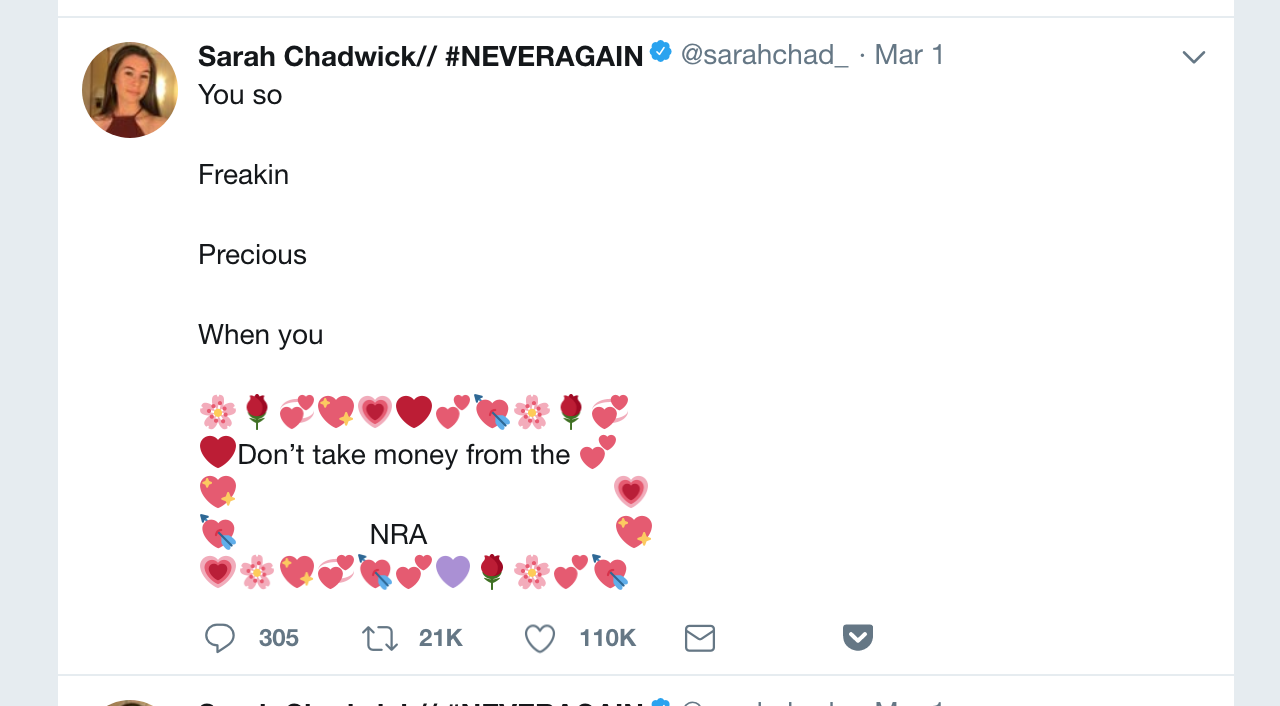

Jaclyn Corin @JaclynCorin : The Organizer
Was on the Ellen Degeneres Show with David Hogg and Emma Gonzalez, organized a trip to the Capitol in Tallahassee to talk gun control, and made this sweet sweet viral vid. Was the MSD Junior Class President before all this went down.
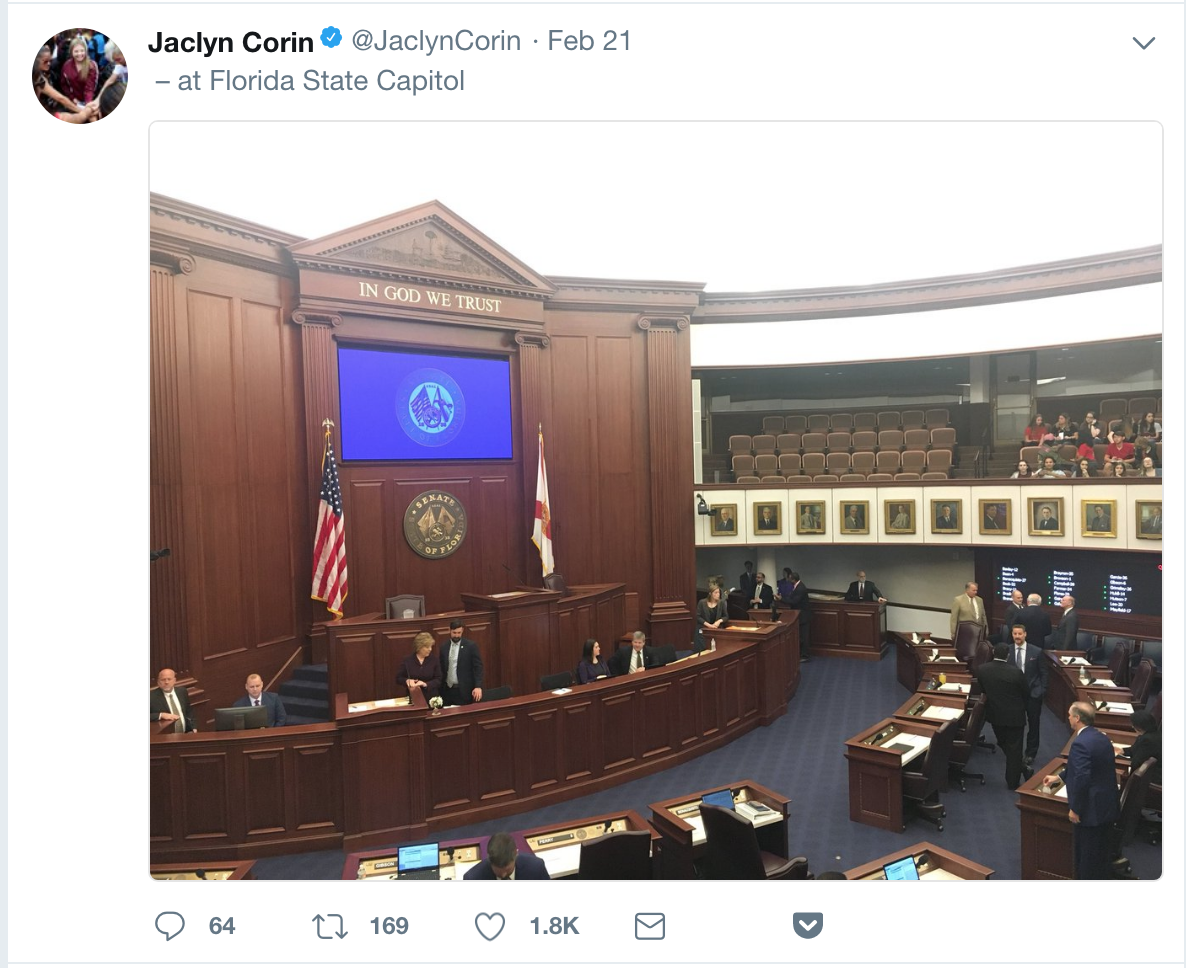
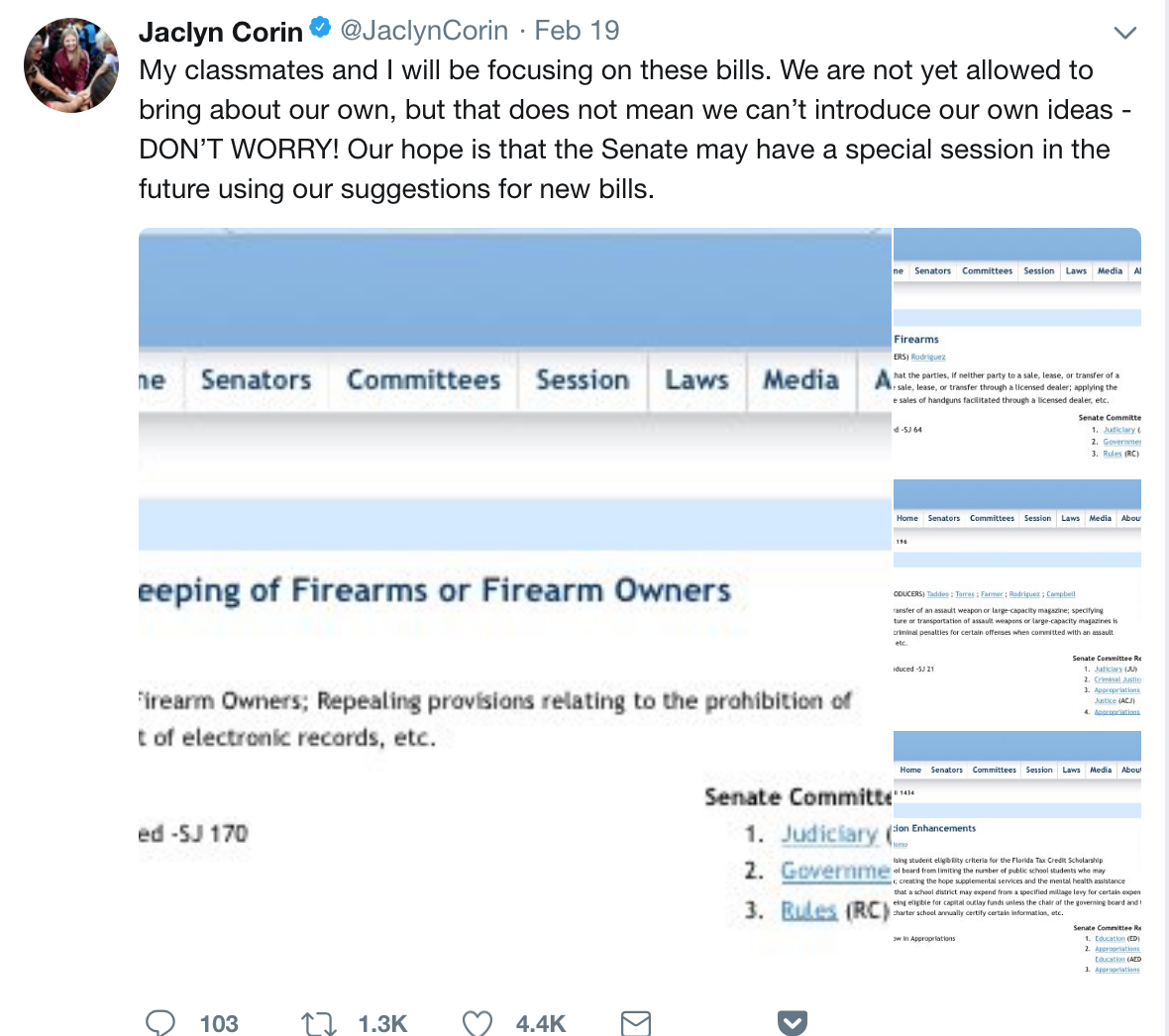
Emma Gonzalez (@Emma4Change): Real-Life Eleven
The face of the movement, as well as the president of the Gay-Straight Alliance at Parkland Stoneman Douglas High School . Known for her passionate speech on CNN in the days after the attack, as well as her appearance on the Ellen Degeneres Show and at pretty much every event since the shooting. Known for battle cries such as “YOU WILL READ ABOUT US IN HISTORY BOOKS” and “WE CALL BS.”
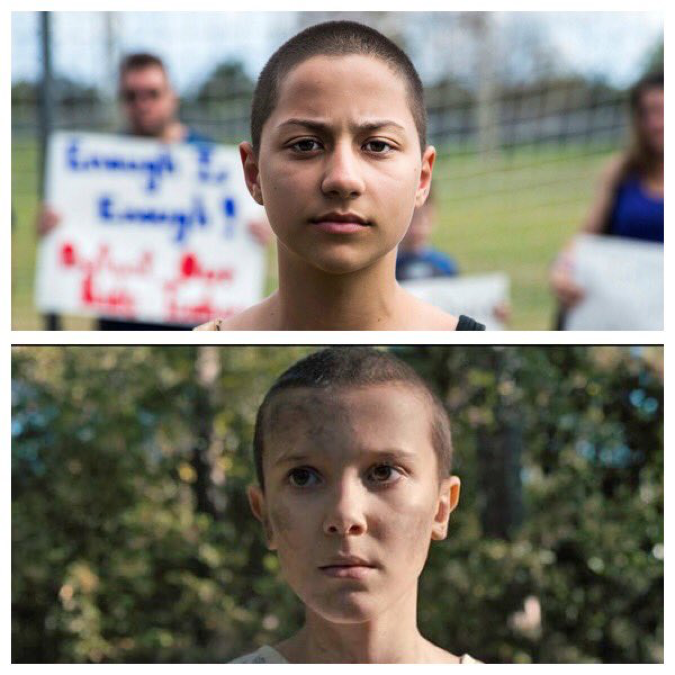

David Hogg (@davidhogg111): Fact Man
Filmmaker, school journalist, and self-proclaimed terrible speller. Known for his cell phone video during the attack, the day-of interview on CNN that started the “crisis actor” conspiracy theory, and tweeting his way to change. The resident fact-man of the group; does his research and imparts knowledge to the Internet. Also known for the big hullaballoo with Laura Ingraham in which she called him out for not getting into collges and he called her out by encouraging her advertisers to pull out. Check and mate.

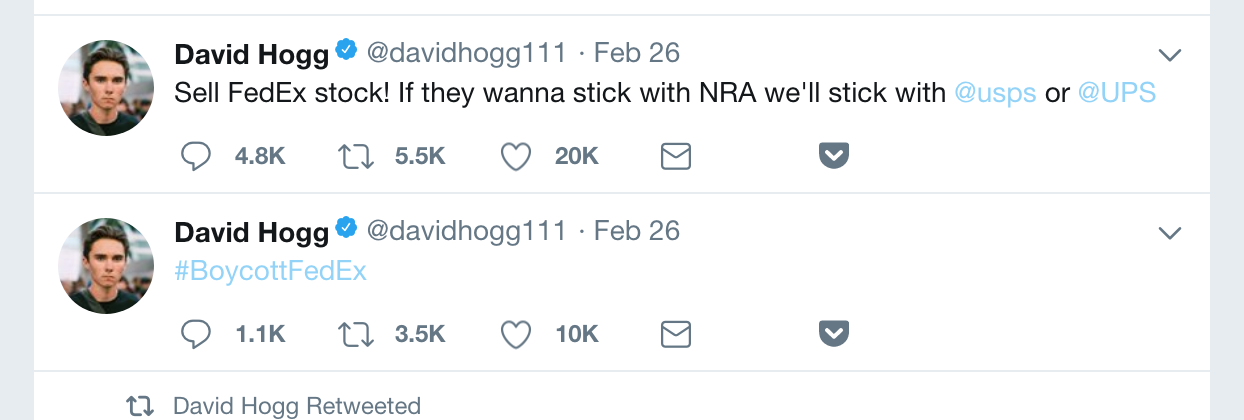
Cameron Kasky (@cameron_kasky): Theater Kid
Creator of the #NeverAgain hashtag and part of the team that conceived the March For Our Lives. Also known for his tour-de-force on Ellen. Resident theater kid, currently preparing for his role in Spring Awakening in the school musical and loves to tweet about it (as well as activism stuff); known for his jibe to Wolf Blitzer that if anyone had seen their production of Fiddler on the Roof, they’d have no doubts that these were real high school kids. Note the Spring Awakening reference in this tweet.
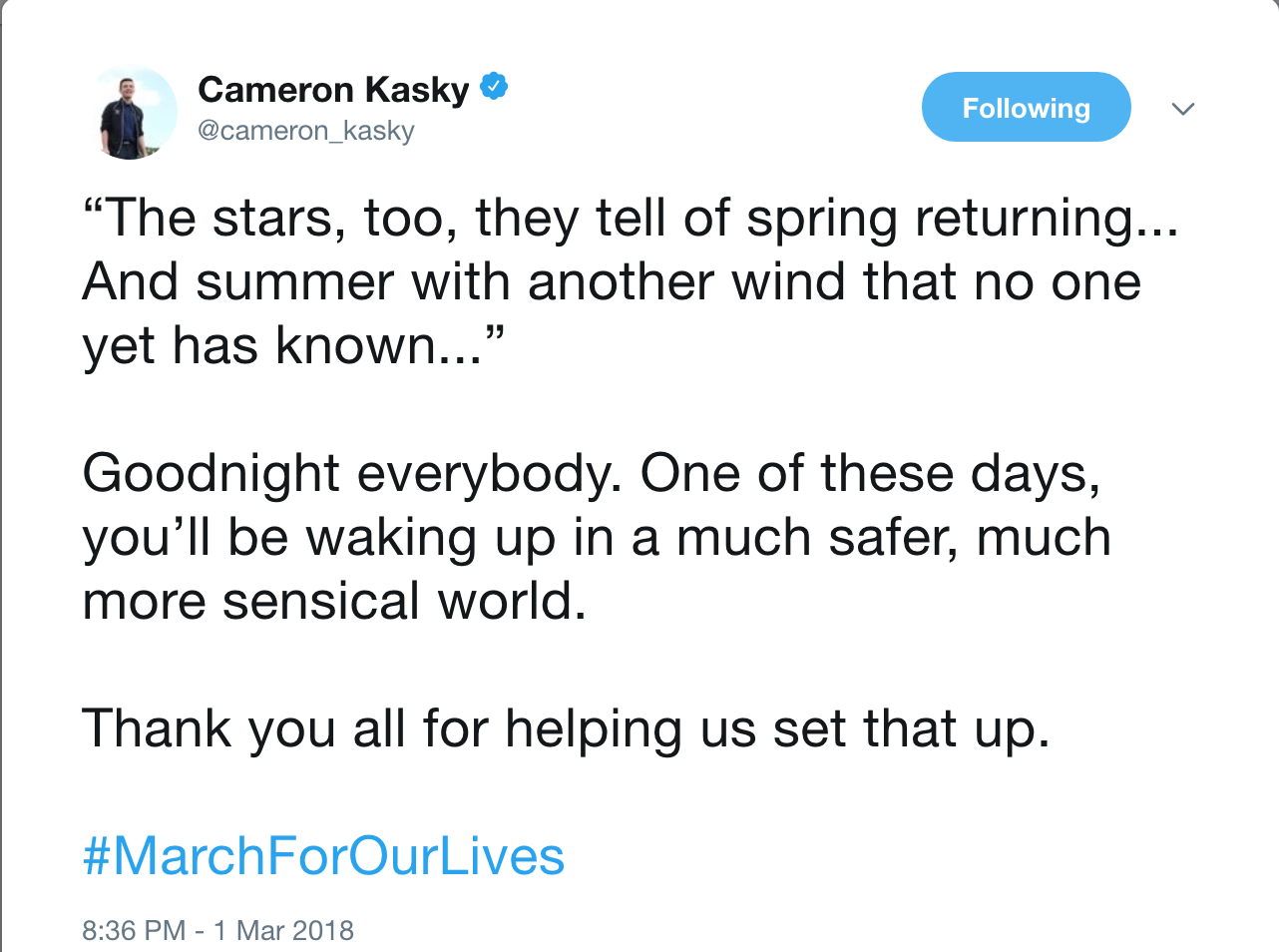
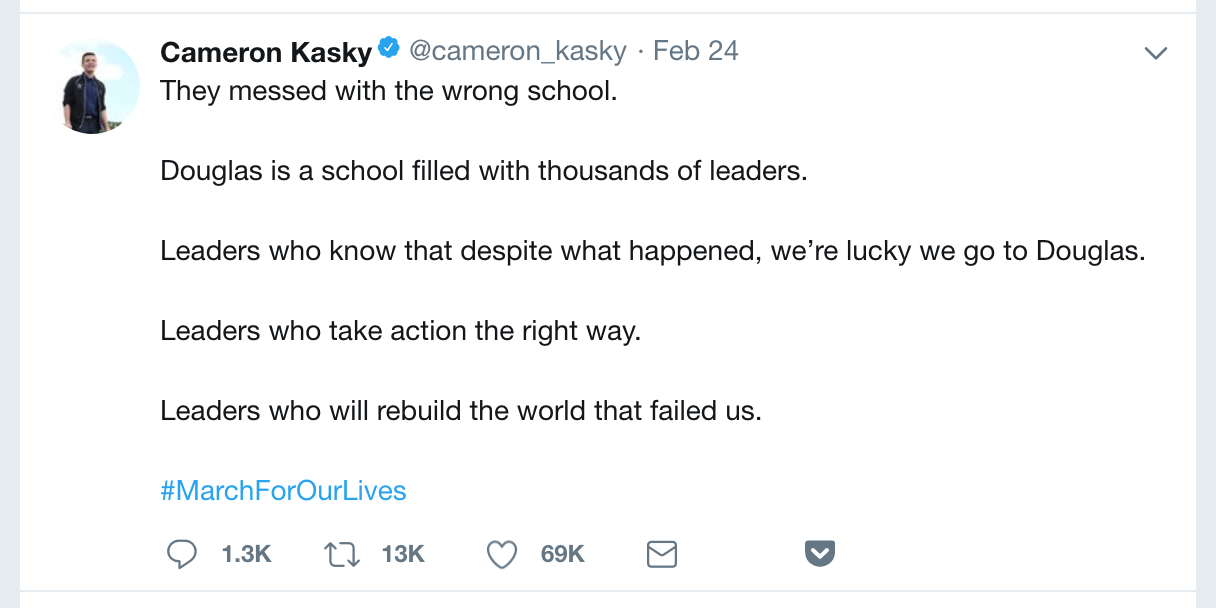
Delaney Tarr @delaneytarr: America’s Sweetheart
Known for announcing to lawmakers on CNN: “We are coming after you,” talking with Jordan Klepper, and writing an opinion piece for Teen Vogue. Articulate, confident, comfortable on camera.
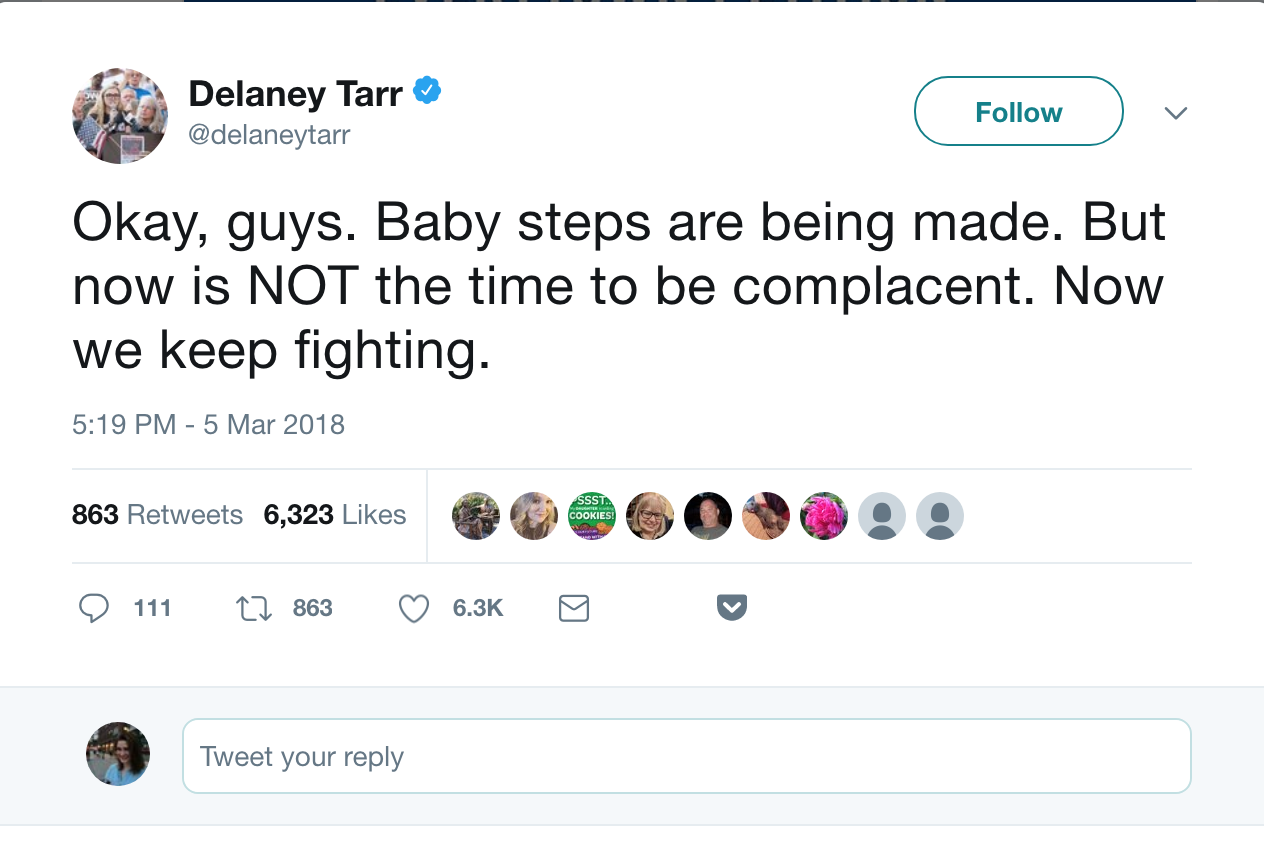
The Parkland students have captured hearts nationwide. But while they’d like to spread their message as far as possible, they do have a target audience: politicians. They have a list of legislative demands, ranging from bump stock bans to age restrictions, and they won’t stop until they’re carried out.
The most recent development in the gun reform debate is SB7026: a bill that raises the legal age for buying rifles to 21, imposes a 3-day waiting period on all firearms sales, and establishes a voluntary program for arming non-teacher school personnel. This Friday, after intense debates in the House and Senate, Governor Rick Scott signed the bill into law.
Politicians, unlike high school students, aren’t known for being social media-savvy. Some have tried to adapt, using Twitter as a platform for sharing their own views on gun reform; others shy away from the debate (or from social media entirely). Let’s look at how Florida’s politicians have acted on Twitter — we’ll let you decide who the real superheroes are.
State Level:
Sen. Bill Galvano @BillGalvano: The Outraged
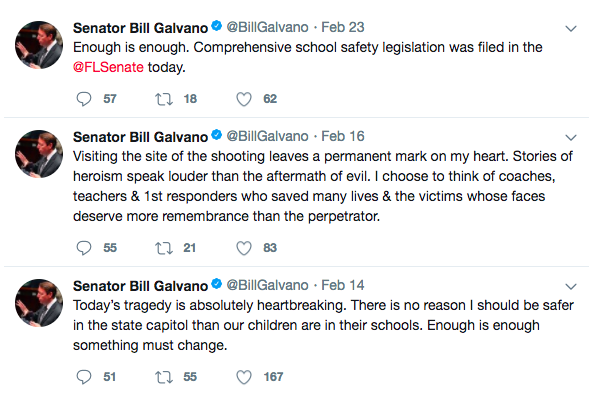
In forming SB7026, Bill Galvano was one of the strongest advocates for arming teachers. Although the bill was eventually rewritten to only voluntarily arm non-teacher personnel, Galvano’s proposition sparked outrage and controversy across the nation. His Twitter profile is surprisingly quiet when it comes to this idea, and instead focuses on the emotional argument to pass some kind of reform.
Rep. Jared Moskowitz @JaredEMoskowitz: The Amplifier
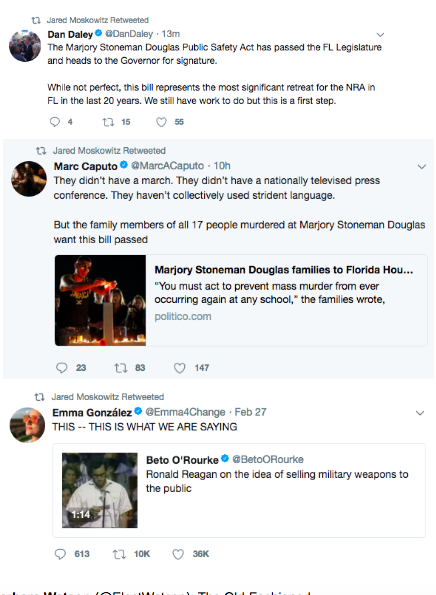
After SB7026 passed the senate, Florida House Democrats faced a problem: would they support a bill that allowed for arming non-teacher school officials? Jared Moskowitz, Representative for the Parkland district and alumnus of Marjory Stoneman Douglas High School, made his position clear on Twitter: he would support the bill, because that’s what his constituents wanted (see second tweet). This follows his typical tweeting pattern: he seldom tweets himself, but he retweets his constituents—including Emma Gonzalez!—several times a day.
Rep. Barbara Watson (@ElectWatson): The Old-Fashioned
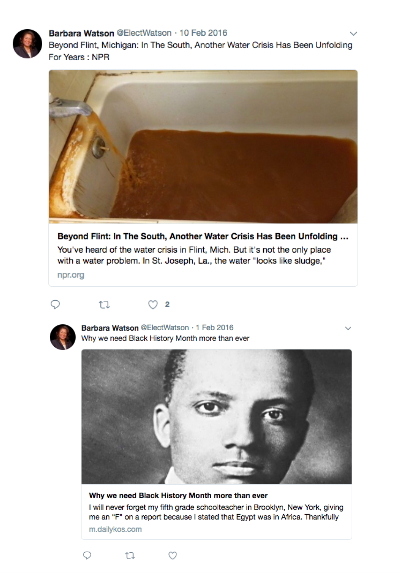
Barbara Watson was one of the House Democrats that disagreed with Watson, arguing that Democrats should not support any bill that puts more guns in schools. She delivered compelling arguments that arming schools would pose a disproportionate risk to black teachers and students—but unfortunately, they weren’t on Twitter. Watson hasn’t used her Twitter since her 2016 campaign, when she tweeted about the water crisis in Flint, Michigan.
Gov. Rick Scott @ScottForFlorida: The Moderate
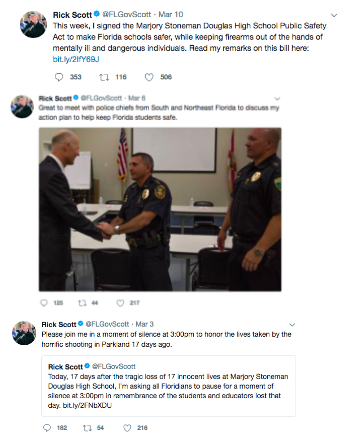
Unlike the Parkland students, Florida Governor Rick Scott isn’t particularly vocal on Twitter. It’s hard to tell what he’s really thinking, but this makes sense: he’s one of the most complex characters in the game. While Scott has decried the tragedy in Parkland and criticized Washington for inaction, he’s also received an A+ rating from the NRA. His tweets about Parkland are sparse, and don’t reveal much political affiliation. Before Friday, no one knew if he would sign SB7026. By signing the bill, he’s alienated himself from the NRA—but has been showered with support from the left. Only time will tell if he returns to the center.
National Level:
Bill Nelson (@SenBillNelson): The Advocate
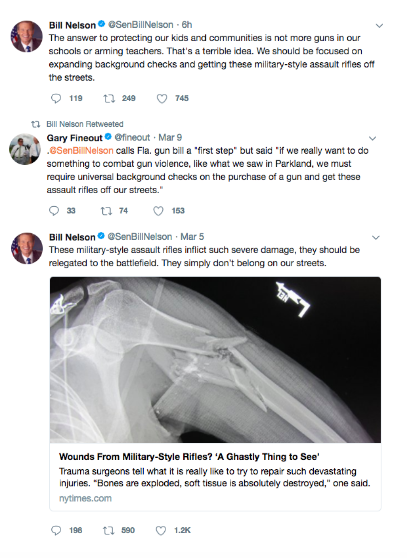
Florida Senator—and upcoming gubernatorial candidate—Bill Nelson has been one of the most vocal supporters of gun reform on Twitter. He has supported a variety of national bills to curb firearm access, including one that would enhance the background check system to alert authorities if someone on the no-buy list attempted to purchase a gun. On Twitter, he posts passionately about gun control and criticizes the Florida bill for only being a first step towards more comprehensive reform. It is perhaps his outspoken Twitter advocacy that caused him to be snubbed from a bipartisan meeting of Florida senators and President Trump—because we all know how seriously Trump takes Twitter.
Marco Rubio (@marcorubio): The Indignant
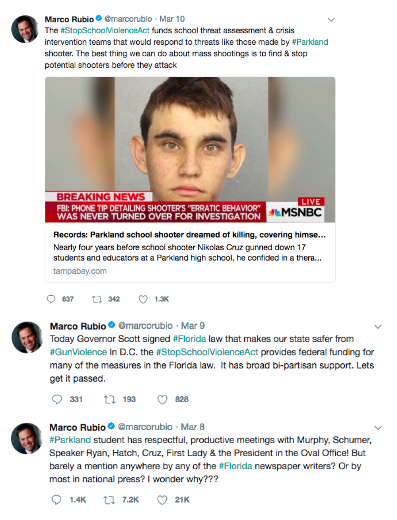
Although Rubio and Nelson support many of the same national bills, their views are markedly different. As one of the most controversial voices in the debate, Rubio offers a more conservative perspective on gun reform. Though he hasn’t tweeted anything against gun control efforts, he spends a disproportionate amount of time criticizing Florida newspapers for failing to adequately cover pro-gun Parkland student Kyle Kashuv, and suggests that identifying and stopping potential shooters is more important than limiting guns. He (as well as one other notable tweeter) helps us remember—just because you use Twitter, doesn’t mean you’re doing it right.